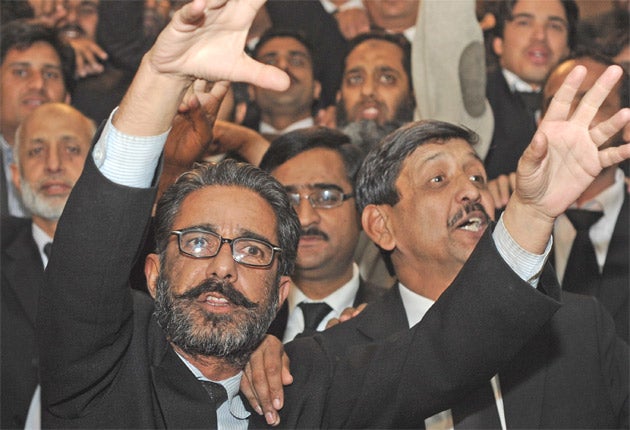New crisis for Pakistan as Zardari faces corruption charges
President faces calls to quit as Supreme Court throws out amnesty

Your support helps us to tell the story
From reproductive rights to climate change to Big Tech, The Independent is on the ground when the story is developing. Whether it's investigating the financials of Elon Musk's pro-Trump PAC or producing our latest documentary, 'The A Word', which shines a light on the American women fighting for reproductive rights, we know how important it is to parse out the facts from the messaging.
At such a critical moment in US history, we need reporters on the ground. Your donation allows us to keep sending journalists to speak to both sides of the story.
The Independent is trusted by Americans across the entire political spectrum. And unlike many other quality news outlets, we choose not to lock Americans out of our reporting and analysis with paywalls. We believe quality journalism should be available to everyone, paid for by those who can afford it.
Your support makes all the difference.Pakistan was plunged into fresh political turmoil last night after its Supreme Court overruled a corruption amnesty that had protected leading political figures including President Asif Ali Zardari.
In a severe blow to Mr Zardari's already shaky and unpopular rule, the country's highest court also revived corruption charges against him dating back to the 1990s.
In its ruling, the 17-member court decided that an amnesty issued by the former president Pervez Musharraf was illegal. The decision could open the way for opponents of the government to mount a legal challenge to Mr Zardari's 2008 election, even though legal experts argue that a president cannot be prosecuted because he is protected by virtue of his office.
The Supreme Court is led by the outspoken Chief Justice Iftikhar Chaudhry. Following its decision to withdraw the immunity, which Mr Chaudhry called "unconstitutional", at least two senior ministers and aides to Mr Zardari will face charges that haunted them after earlier stints in government.
The Interior minister Rehman Malik and Defence minister Ahmed Mukhtar are listed among 8,000 beneficiaries of the amnesty. Many others on the list face criminal or graft charges.
Pressure was also mounting on President Zardari to resign last night, although he denies any wrongdoing.
The clamour for both him and the accused ministers to step down until they have cleared their names in court is likely to grow, from both the opposition and within the ruling party.
"He is not immune forever," said Khwaja Muhammad Asif, a prominent MP in former prime minister Nawaz Sharif's party, the Pakistan Muslim League-N. "As long as he is in office, he cannot be served with a warrant,but there is also a moral position. He holds the highest office in the land. For the dignity of that office, he is morally bound, if morality means anything to him, to leave his office and face the charges."
The President's aides in Islamabad said there was no question of him resigning. Farahnaz Ispahani, Mr Zardari's spokesperson said: "The only constitutional way to remove [the president] is impeachment by both houses of Parliament with a two-thirds majority."
The more immediate effect of the latest legal setback is a further weakening of Mr Zardari's grip on power as criticism of his government intensifies. It comes as Pakistan faces an unrelenting wave of suicide bombings and her army is locked in battle against the Taliban near the Afghan border in South Waziristan province.
With his approval ratings at an all-time low, Mr Zardari has increasingly been subjected to fierce media attacks in recent weeks. Tainted by political and financial scandals throughout his career, the widower of Benazir Bhutto is known by his critics and opponents as "Mr 10 Per Cent", a reference to his financial dealings. He served multiple prison terms for murder and corruption before rising to the presidency following his wife's assassination in December 2007. The couple always claimed that charges against them were politically motivated.
While Mr Zardari may be able to cling on to his job, there is likely to be what observers call "moral pressure" on him to relinquish many of the powers he inherited from Mr Musharraf and assume a ceremonial role. In that event the reins will inevitably shift to his Prime Minister Yousaf Raza Gilani, who is seen as a weaker figure without a political base of his own.
Analysts see Mr Gilani as being more vulnerable to pressures from the powerful military establishment, while Mr Zardari is widely viewed as being close to Washington.
The law granting politicians an amnesty was brought in by Mr Musharraf in 2007 as part of a power-sharing pact he struck with Ms Bhutto enable her to return from exile. A weakened Mr Zardari is likely to complicate America's efforts across the border in Afghanistan.
For the forthcoming surge of 30,000 US troops to achieve its goals, Washington needs Pakistan's help to stop cross-border attacks. US military commanders are urging Pakistan to expand its current offensives to include the Afghan Taliban leadership and like-minded militants who attack US and Nato forces.
Join our commenting forum
Join thought-provoking conversations, follow other Independent readers and see their replies
Comments